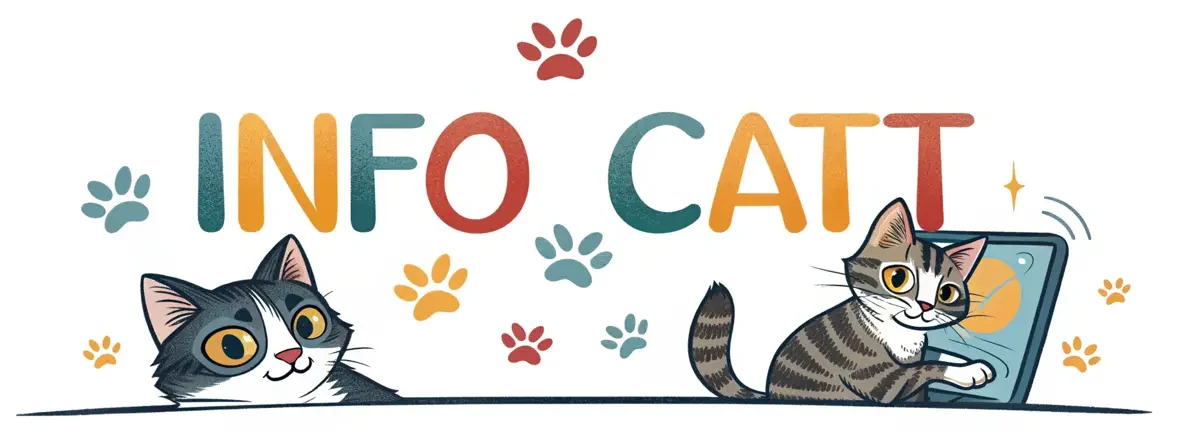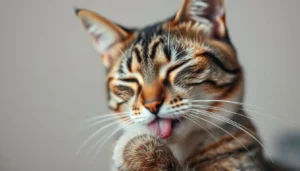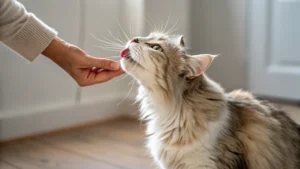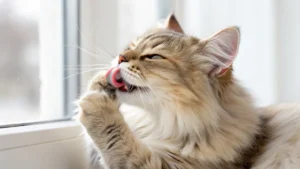Ever wondered why your furry friend keeps showering you with wet, sandpaper-like kisses? Cat licking behavior is far more complex than you might think. As a cat parent, I’ve spent countless hours puzzling over my own cat’s affectionate yet sometimes overwhelming licking habits.
Understanding why cats lick their humans can unlock a deeper connection with your feline companion. Your cat’s licking isn’t just a random action – it’s a sophisticated form of communication. It reveals volumes about their emotional world and instinctive behaviors.
Whether you’re curious about cat licking reasons or trying to decode your pet’s unique way of showing love, this guide will help you understand the fascinating world of feline interactions. Let’s dive into the surprising motivations behind why your cat might be treating you like their personal grooming project.
The Natural Science Behind Cat Licking Behavior
Cats are fascinating creatures with complex grooming habits. Their unique feline licking behavior is deeply rooted in biological and evolutionary mechanisms. These mechanisms tell a remarkable story of survival and social bonding.
Exploring why cats lick humans reveals the intricate science behind their natural instincts. These behaviors are not random. They are carefully developed survival strategies passed down through generations.
Understanding Your Cat’s Grooming Instincts
Cat grooming habits are more than just a cleaning ritual. They serve multiple purposes in feline communication and social interaction:
- Maintaining body temperature
- Distributing natural oils across fur
- Reducing stress and promoting relaxation
- Establishing social connections
The Role of Barbed Tongues in Feline Behavior
A cat’s tongue is a marvel of natural engineering. Covered in tiny, backward-facing barbs called papillae, their tongue functions like a built-in brush. These microscopic hooks help cats:
- Remove dirt and loose fur
- Detangle their coat
- Stimulate blood circulation
“A cat’s tongue is nature’s most sophisticated grooming tool” – Veterinary Researchers
Early Learning from Mother Cats
Kittens learn sophisticated grooming behaviors from their mothers during the first weeks of life. This early training establishes lifelong patterns of social interaction and care. It influences how cats communicate with humans and other animals.
Understanding these scientific foundations helps cat owners appreciate the deep emotional and biological significance behind their pet’s seemingly simple licking behavior.
Why Does My Cat Lick Me? Common Reasons Revealed
It can be confusing to figure out why cats lick their owners. Cat affection is complex and has many layers. Your cat might be trying to tell you several things through this simple action.
Let’s look at the main reasons for your cat’s licking:
- Showing Genuine Affection: When your cat licks you, it’s often a sign of deep emotional connection. This behavior mimics how mother cats groom their kittens, showing love and trust.
- Marking Their Territory: Cats use scent glands to claim ownership. By licking you, they’re saying “you’re part of my family” through body language.
- Seeking Attention: Some cats learn that licking gets an immediate response from their humans, making it an effective way to communicate.
Cats are sophisticated communicators. Their licking can show emotions like comfort or stress. Watching their body language gives deeper insights into their motivations.
“A cat’s lick is more than just a wet touch – it’s a complex form of communication.” – Feline Behavior Experts
Notice the context and how often your cat licks. Occasional, gentle licks usually mean affection. But if they lick a lot, it might mean they’re stressed or have health issues.
- Gentle, infrequent licks: Positive bonding
- Persistent, intense licking: Potential stress indicator
Every cat is different. Understanding their unique way of communicating strengthens your bond and ensures their emotional well-being.
Expressing Love and Building Bonds Through Licking
Cats show love in special ways, unlike other pets. They use licking to show affection and bond with humans. When they lick your face and hands, it’s more than just grooming.
The meaning behind cat licking is deep. It’s a key part of their social behavior. Cats lick for many reasons:
- To show trust and emotional bond
- To share their scent with family
- To feel a sense of belonging and security
Social Bonding in Cat Communities
In the wild, cats groom each other to build social bonds. This is called allogrooming. Domestic cats see humans as part of their family too.
“When your cat licks you, they’re saying ‘You’re family, and I care about you.'” – Feline Behavior Expert
Creating Family Connections
Your cat’s licking shows deep emotional bonding. They see you as a trusted friend, like family. This act is their way of showing love and acceptance.
Marking Territory and Ownership
Cat licking also marks territory. By leaving their scent on you, they claim you as their own. It’s a sign that you’re important to them.
When Cat Licking Becomes Excessive
Cat licking can change from a loving act to a worrying sign when it gets too much. Most cats lick their owners as a way to show love. But, some cats start licking too much, which can mean there’s a problem.
It’s important to know why cats lick for attention. Excessive licking might show that your cat is facing some big issues. These could be:
- Chronic cat licking anxiety
- Stress-related behavioral changes
- Potential medical conditions
- Neurological disruptions
If your cat starts licking their head or your body a lot, it’s a warning sign. Compulsive licking often comes from emotional stress or changes in their environment. Cats might lick too much when they feel:
- Anxious about changes in their environment
- Experiencing separation from their owner
- Dealing with undiagnosed health problems
Look out for signs like raw skin, hair loss, or constant licking that stops them from doing normal things. These signs mean you should see a vet. They can check for health problems and help find a solution.
Persistent licking is your cat’s way of communicating something is wrong—listen carefully to their non-verbal signals.
Health-Related Reasons for Cat Licking Behavior
Your cat’s licking can tell you a lot about their health. While some licking is normal, too much might mean they’re not feeling well.
Cat licking can mean different things, like health problems. Knowing what it means can help you take better care of your cat.
Anxiety and Stress Signals
Cats lick when they’re stressed or anxious. This can happen when their environment changes or they feel lonely.
- Sudden changes in household environment
- Introduction of new pets or family members
- Disrupted daily routines
- Lack of mental stimulation
Medical Conditions to Watch For
Too much licking can be a sign of health issues. Some problems include:
- Skin allergies causing persistent itching
- Hormonal imbalances
- Digestive system problems
- Neurological disorders
When to Consult a Veterinarian
Watch for changes in your cat’s licking. If you see:
- Continuous, compulsive licking
- Visible skin irritations
- Weight loss
- Significant behavioral changes
Seeing a vet early can stop bigger health problems. They can find and treat the cause of your cat’s unusual licking.
How to Respond to Your Cat’s Licking Habits
Understanding why your cat licks you is key to managing cat licking behavior. While cat affection behavior can be adorable, sometimes it requires gentle guidance and understanding.
When your cat begins to lick excessively, try these practical strategies:
- Redirect the licking with interactive toys
- Provide positive reinforcement for calm behavior
- Create designated bonding times
- Use gentle distraction techniques
If you’re wondering why does my cat lick me so much, consider the underlying emotional needs. Cats often lick as a sign of comfort and connection. Recognizing these signals helps strengthen your bond.
For persistent licking, consider these approaches:
- Observe the frequency and context of licking
- Check for potential stress triggers
- Ensure your cat receives enough mental stimulation
- Consult a veterinarian if behavior seems compulsive
Remember, each cat is unique. Patient understanding is your best approach to managing their licking habits.
Gentle redirection and consistent boundaries help maintain a healthy relationship with your feline friend.
Conclusion
Understanding why your cat licks you opens up a world of feline communication. Cat licking is not just random. It shows deep affection and helps establish social bonds.
Exploring why your cat licks you reveals a complex interaction. It’s rooted in instinct, emotion, and evolutionary behavior. Licking is a way for cats to communicate trust, bonding, and love.
By understanding these behaviors, you can connect deeper with your cat. Pay attention to changes in licking patterns. They might signal health concerns or emotional shifts. Your awareness can strengthen your bond with your cat.
Each lick tells a story of connection, care, and the language of cats. Embrace these moments. They are precious glimpses into your cat’s emotional world.
FAQ
Why do cats lick their owners?
Cats lick their owners for many reasons. They show love, mark their territory, and groom. They also seek attention and bond socially. This behavior comes from their early life with their mother and social interactions.
Is it normal for my cat to lick me excessively?
Some licking is okay, but too much might mean your cat is stressed or sick. If your cat’s licking is too much or odd, see a vet. They can check for health problems.
Does cat licking mean my cat loves me?
Yes, licking is a sign of love and trust. Cats treat owners like family, grooming them like they do other cats. It shows they feel safe and comfortable with you.
Why does my cat lick my face and hands?
Cats lick faces and hands to bond and groom. They find your scent interesting and mark you with their own. It’s their way of claiming you as family.
Can cat licking be a sign of stress?
Yes, too much licking can be a stress sign. If your cat is licking more, they might be stressed. This could be due to new pets, moving, or changes in routine.
How should I respond when my cat licks me?
Respond with gentle petting or calm acknowledgment. If it’s too much, use a toy or distraction. Avoid punishing them. It’s their way of showing love and communication.
Is cat licking a form of communication?
Yes! Licking is a key way cats communicate. They use it to show feelings, mark territory, and bond. It helps them express stress or their mood to humans and other animals.
When should I be concerned about my cat’s licking?
Be worried if licking is obsessive, causes hair loss, or skin problems. These signs might mean allergies, skin issues, or stress. Always check with a vet if you’re unsure.



